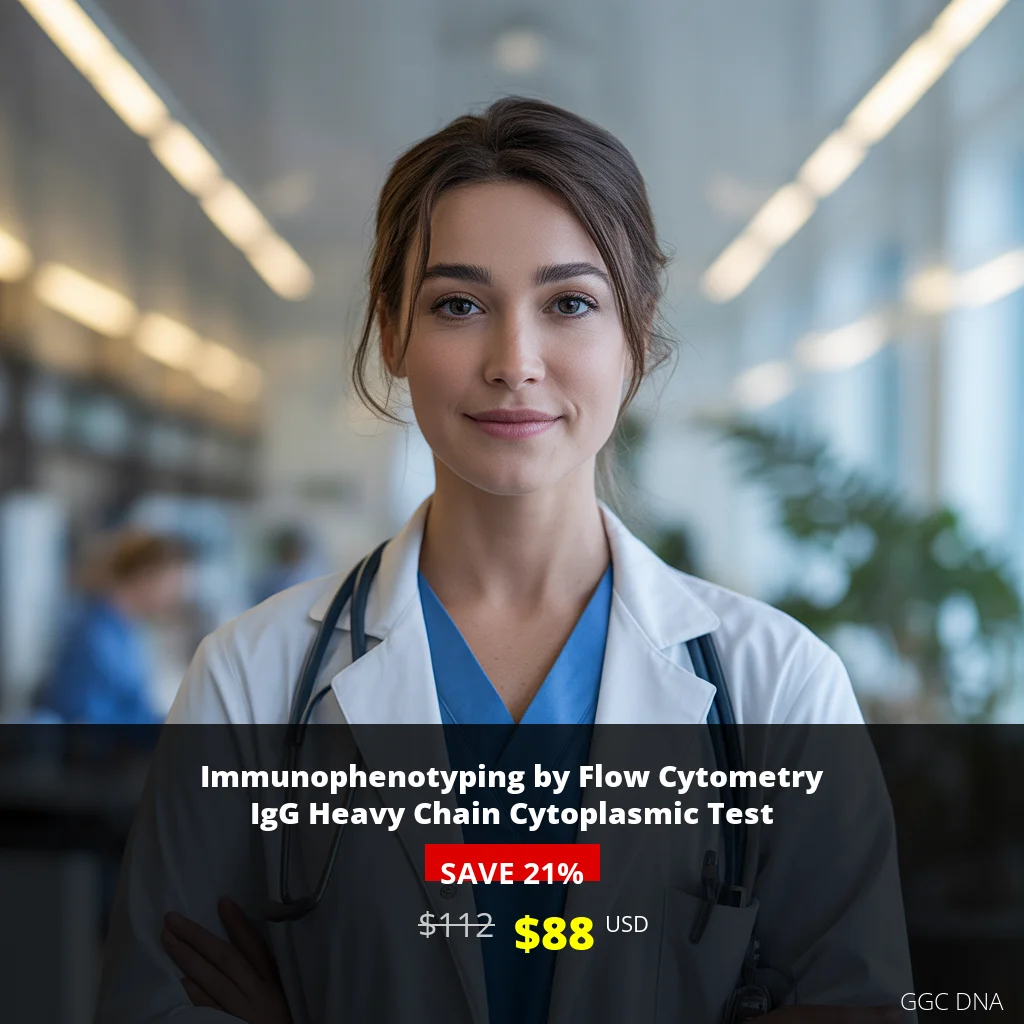Immunophenotyping by Flow Cytometry IgG Heavy Chain Cytoplasmic Test
Comprehensive Diagnostic Testing for Plasma Cell Disorders
The Immunophenotyping by Flow Cytometry IgG Heavy Chain Cytoplasmic Test represents a cutting-edge diagnostic approach in modern hematology and oncology. This sophisticated laboratory technique utilizes flow cytometry to detect and quantify the cytoplasmic expression of IgG heavy chains within cells, providing crucial insights into cellular differentiation and malignant transformations. As a specialized diagnostic tool, it plays an indispensable role in the accurate classification and management of various hematologic malignancies, particularly those involving B-cell lineage and plasma cell disorders.
What This Advanced Test Measures and Detects
This specialized immunophenotyping test specifically targets and measures the cytoplasmic expression of IgG heavy chains using highly sensitive flow cytometry technology. The test provides comprehensive analysis of:
- Cytoplasmic IgG heavy chain expression patterns
- Plasma cell identification and characterization
- B-cell differentiation status and maturation
- Malignant cell population identification
- Clonal plasma cell expansion detection
- Intracellular immunoglobulin production assessment
Clinical Applications and Diagnostic Significance
The detection of cytoplasmic IgG heavy chains serves as a critical marker for identifying plasma cell neoplasms and specific subtypes of B-cell lymphomas. This test helps distinguish between reactive and malignant plasma cell populations, enabling precise diagnosis and appropriate treatment planning.
Who Should Consider This Important Diagnostic Test
This specialized immunophenotyping test is recommended for individuals presenting with specific clinical indications and symptoms, including:
- Patients with suspected multiple myeloma or plasma cell disorders
- Individuals showing unexplained bone pain or pathological fractures
- Patients with elevated serum protein levels or monoclonal gammopathy
- Those experiencing unexplained anemia, fatigue, or recurrent infections
- Individuals with abnormal bone marrow findings on previous testing
- Patients requiring monitoring of known plasma cell disorders
- Cases where B-cell lymphoma diagnosis requires further characterization
Symptoms That May Warrant Testing
Clinical symptoms that might indicate the need for this test include persistent bone pain, unexplained weight loss, recurrent infections, fatigue, anemia, hypercalcemia, or renal impairment without clear cause.
Significant Benefits of Immunophenotyping Testing
Choosing the Immunophenotyping by Flow Cytometry IgG Heavy Chain Cytoplasmic Test offers numerous advantages for patients and healthcare providers:
- Accurate Diagnosis: Provides precise identification of plasma cell disorders and specific lymphoma subtypes
- Early Detection: Enables early identification of malignant transformations before advanced disease progression
- Treatment Guidance: Helps oncologists and hematologists develop targeted treatment strategies
- Monitoring Capability: Allows for effective monitoring of disease progression and treatment response
- Rapid Results: Same-day reporting ensures timely clinical decision-making
- Comprehensive Analysis: Offers detailed cellular characterization beyond standard testing methods
Understanding Your Test Results
Interpreting the results of the Immunophenotyping by Flow Cytometry IgG Heavy Chain Cytoplasmic Test requires specialized medical expertise. Here’s general guidance on understanding your results:
Positive Results Interpretation
Detection of cytoplasmic IgG heavy chain expression typically indicates the presence of plasma cells or specific B-cell populations. The pattern and intensity of expression help determine whether the cells are reactive or malignant. Your hematologist or oncologist will correlate these findings with clinical presentation and other laboratory results.
Negative Results Interpretation
Absence of cytoplasmic IgG heavy chain expression in appropriate clinical contexts may help rule out certain plasma cell disorders or suggest alternative diagnoses. However, comprehensive clinical correlation remains essential for accurate interpretation.
Quantitative Analysis
The test provides quantitative data about the percentage of cells expressing cytoplasmic IgG heavy chains, which helps in assessing disease burden and monitoring treatment response over time.
Test Pricing and Availability
| Price Type | Amount (USD) |
|---|---|
| Discount Price | $88 |
| Regular Price | $112 |
Testing Specifications
- Turnaround Time: Sample Daily by 9 am; Report Same day
- Sample Requirements: 3 mL (2 mL min.) whole blood in 1 Lavender Top (EDTA) tube AND 3 mL (2 mL min.) whole blood in 1 Green Top (Sodium Heparin) tube OR 2 mL (1 mL min.) Bone marrow in 1 Green Top (Sodium heparin) tube
- Shipping Instructions: Ship immediately at 18-22°C. DO NOT REFRIGERATE OR FREEZE
- Documentation: Specify time, date and clinical details on test request form
Nationwide Testing Availability
GGC DNA maintains comprehensive testing facilities across the United States, ensuring accessible diagnostic services in all major metropolitan areas. Our network includes specialized centers in:
- New York City and surrounding regions
- Los Angeles and Southern California
- Chicago and the Midwest
- Houston and Texas metropolitan areas
- Miami and Florida locations
- Philadelphia and Northeast regions
- Phoenix and Southwest territories
Take Action for Your Health Today
Don’t delay crucial diagnostic testing for potential hematologic conditions. Our Immunophenotyping by Flow Cytometry IgG Heavy Chain Cytoplasmic Test provides the advanced diagnostic capabilities needed for accurate plasma cell disorder identification and management. With same-day results and comprehensive analysis, you can receive timely information to guide your healthcare decisions.
Book your test now or call our dedicated healthcare line for immediate consultation:
+1(267) 388-9828
Our experienced medical team is available to discuss your testing needs, answer questions about the procedure, and help you schedule your appointment at the most convenient location. Early detection and accurate diagnosis are crucial for effective management of hematologic conditions – take the first step toward comprehensive care today.







